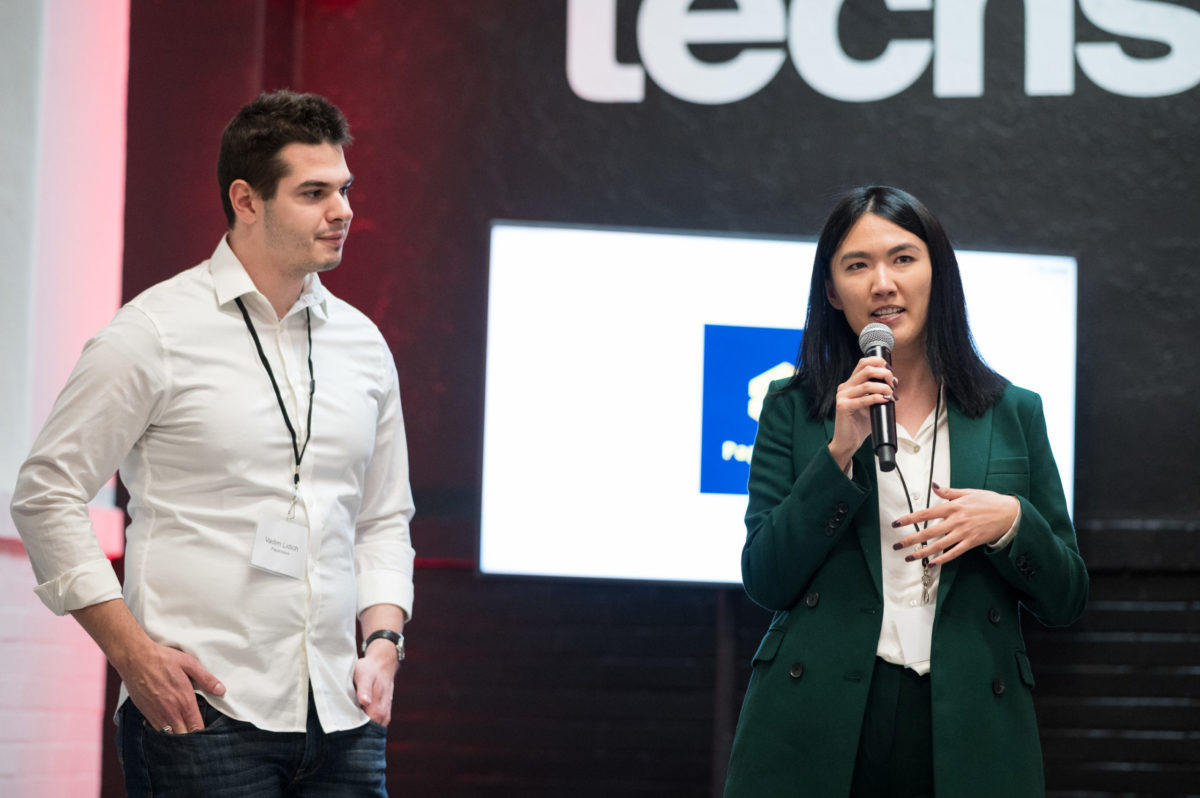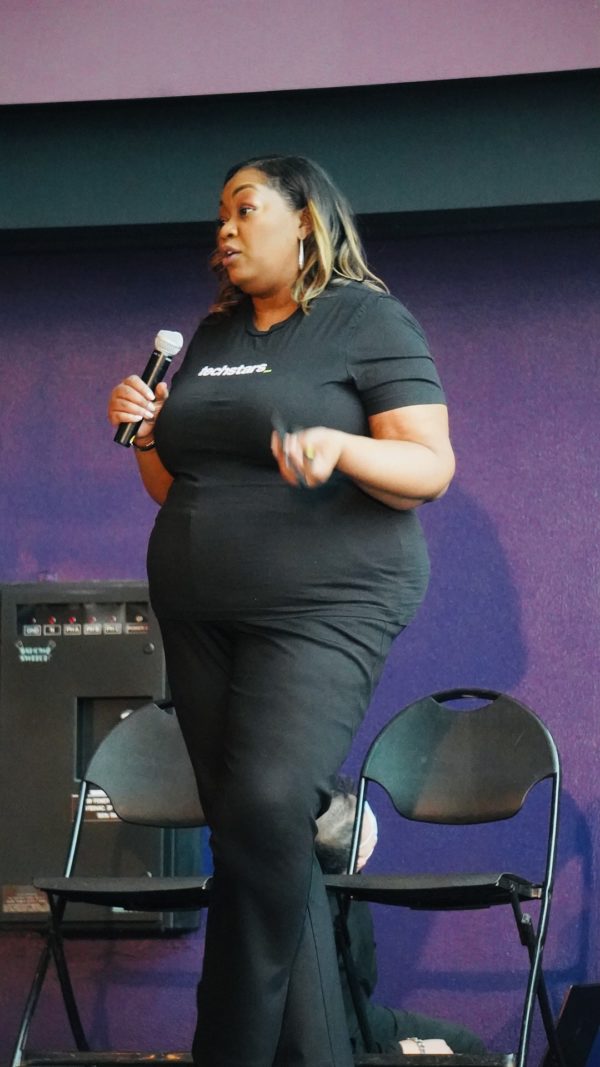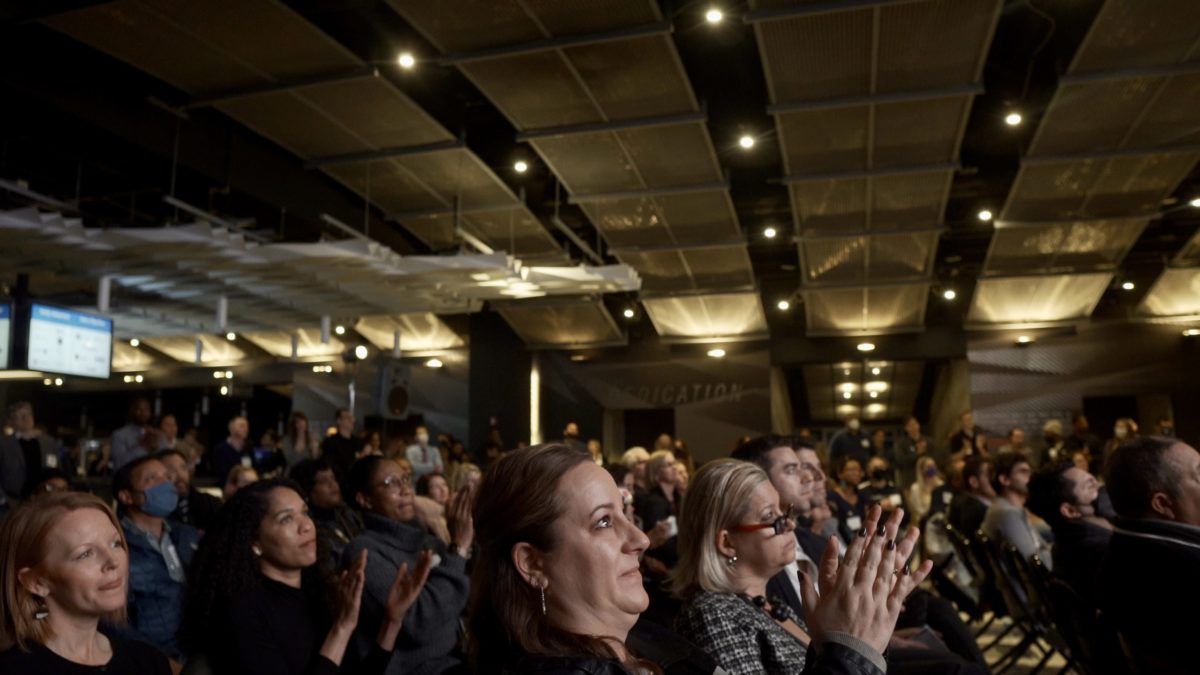They came to Baltimore from as far as Canada and Europe during a pandemic that upended their sector’s definition of “local.”
Yet several leaders of the 12 companies in the first Techstars Equitech Accelerator cohort used their Demo Day event at M&T Bank Stadium last Thursday to emphasize how much Charm City’s tech sector matters to them.
Perhaps chief among the takeaways from their praise-filled presentations, before about 350 gathered investors and other interested parties, was the revelation that at least three of the startups not already based in Baltimore will officially relocate to the area.
Jamie McDonald, CEO of Techstars’ accelerator partner UpSurge Baltimore, and the accelerator’s managing director, Monica Wheat, confirmed to Technical.ly on Friday that the following cohort members are all relocating, as announced during their respective Demo Day presentations:
- SportsHi, a company previously rooted in Brooklyn, New York, which Techstars’ Demo Day program says focuses on helping the nearly 65,000 Gen Z students using its platform access educational and career opportunities, including scholarships
- Zimbali Networks, originally of DC, which developed the ZIMBALI platform to simplify and modernize global finance by linking buyers, sellers and lenders
- Sparen Homes, from Detroit, which allows users to conduct real estate sales or purchases in a consolidated platform that does not rely on real estate agent intermediaries
McDonald added that one of two participant companies with a significant European presence — Dublin-based SURU, whose PSi platform uses a proprietary algorithm to help companies and local governments draw better decision-making information from large meetings — is looking into the “lengthy and regulated process” of making Baltimore its US headquarters.

Eddie de Guia (facing camera) speaks during a session with investors for Techstars Equitech Accelerator cohort members, prior to the Demo Day. (Courtesy of Techstars)
The other of those companies, Berlin- and DC-based affordable lending coordinator EQL Finance, Inc. (which also earned a spot on this year’s DC RealLIST Startups roster), will conduct its next hiring round in Baltimore. The company’s CEO Eddie de Guia said Monday that it will create “at least five new roles” for tech, marketing and operations professionals in the region, with a specific “to access the Baltimore ecosystem for new hires.”
While leaders of SURU and the three officially relocating companies did not immediately return Technical.ly’s request for comment, McDonald noted that several of the companies’ leaders mentioned earning significant investments during the Thursday event. For instance, EQL Finance earned a new lead investment (the source and amount of which de Guia declined to name). CEO Michael Ogunsanya of MindStand, a Baltimore-based cohort member and 2021 RealLIST Startups honoree that integrates AI with workplace communications platforms to help employers better understand their workplace culture, said that the Demo Day connected him to three new customers.
Other companies involved in the accelerator are planning to remain involved with its future classes. CEO Assel Beglinova of Toronto-based Paperstack, which links ecommerce sellers with capital and financial services, said that the company hopes to drive other startups to the accelerator.

Paperstack CTO Vadim Lidich (left) and CEO Assel Beglinova speak during the Techstars Equitech Accelerator Demo Day in Baltimore. (Courtesy of Techstars)
“People from all walks of life came together to establish Baltimore as a diverse and inclusive tech city,” Beglinova told Technical.ly on Monday. “This program wouldn’t happen without the passion and commitment from hundreds [of] stakeholders — all working together towards a common vision.”
Beglinova’s thoughts echo UpSurge Baltimore and the accelerator’s emphasis on diversity, equity and inclusion in the city’s tech ecosystem. McDonald and her colleagues use the term “equitech” for its framework that envisions these principles as uniquely important to Baltimore’s tech world. Even without using the same term, these principles are pivotal to how major local players often wish to portray the local tech economy. For instance, Visit Baltimore on Thursday hosted the Tech Summit House in tandem with the Central Intercollegiate Athletic Association basketball tournament, whose participants are all historically Black colleges and universities. The daytime event series featured such highlights as a panel with Fearless CEO Delali Dzirasa and Chief Digital Services Officer David Simeon that addressed the Smithsonian National Museum of African American History and Culture’s immersive Searchable Museum experience.
McDonald and Wheat said Friday that the equitech lens remains crucial to the Baltimore area, whose predominantly Black anchor city still deals with the fallout of racist policies (including disproportionately low representation in its tech sector), even as the pandemic has impacted their geographic anchors.
“We think that, actually, the untethering of companies and the workforce from the traditional brain hubs around the country makes it an ideal time to demonstrate to companies that you can live well in a city like Baltimore,” McDonald said. “You can grow a great company, you can be part of a deep and thriving community that really cares that you’re here. And you can be part of a thesis that is really built around the belief that entrepreneurs come from all backgrounds, and technology can be part of the way the world becomes more equitable.”
“The equitech mission [is] based on pulling in people from diverse backgrounds… [and] with diverse ideas on how to ‘change the world,’ quote-unquote,” Wheat added. “When you have that setup as your starting ground, and you can work anywhere, the choice of where you work becomes super, super critical.”

Monica Wheat, the Techstars Equitech Accelerator’s managing director, speaks during an investor meetup for accelerator cohort members at M&T Bank Stadium in Baltimore. (Courtesy of Techstars)
Regardless of their current or future geographic plans, several leaders from this cohort, which includes numerous founders from underrepresented communities and corporate missions focused on social justice, plan to remain invested as mentors and advisors for the next accelerator. They include Beglinova, de Guia and CEO Pava LaPere of Baltimore-based EcoMap Technologies.
“Over the past year alone, we’ve created 10 jobs within the city, and will likely create 10 more this year,” added LaPere, whose company — also a 2022 RealLIST Startups honoree — uses proprietary algorithms to aggregate information about different community and professional ecosystems. “Over the next few months, we’ll be checking out different locations for our HQ. We’re looking for space that can accommodate our growth, is nearby small businesses and restaurants, and has room for other companies to move in alongside us.”
Techstars and UpSurge Baltimore’s relationship also continues into another program, the STANLEY+Techstars Accelerator, that launched in February with 11 companies focused on electrification. The other members of this year’s Equitech Accelerator include Athlytic, of Detroit, which connects student athletes to endorsement opportunities; Aleria, of New York City, whose platform analyzes workplace inclusion; Upfront, also of New York City, whose platform allows government agencies and parents alike to evaluate childcare provider data; and Femly, of Baltimore, which produces eco-friendly feminine hygiene products and education to end what CEO Arion Long described in program notes as “period poverty.”

This editorial article is a part of What Local Means Now Month of Technical.ly's 2022 editorial calendar.
Before you go...
Please consider supporting Technical.ly to keep our independent journalism strong. Unlike most business-focused media outlets, we don’t have a paywall. Instead, we count on your personal and organizational support.
Join our growing Slack community
Join 5,000 tech professionals and entrepreneurs in our community Slack today!

The person charged in the UnitedHealthcare CEO shooting had a ton of tech connections

Delaware students take a field trip to China using their tablets and ChatGPT

From rejection to innovation: How I built a tool to beat AI hiring algorithms at their own game


